Welcome to Wonderland’s first stop for the Summer Blog Blast Tour 2012! This year there’s already a great crop of interviews with authors and illustrators to whet your appetite, pique your fancy, or whatever figure of speech you prefer. Today, at Wonderland we interview the most awesome Queen of Southern Supernatural Gothic YA, Rosemary Clement-Moore. Ghosts, inexplicable powers, demons and demon-fighters laced with snappy dialogue and a soupçon of sass and humor –if those are up your alley, you’ll want to read on.
Of all the different ghost-busting, demon-fighting, supernaturally gifted heroines you’ve written about, do you have a favorite? What did you enjoy most about writing that character?
Rosemary Clement-Moore: I love all my children the same! No, really. There are pieces of me in all of my characters. Maggie Quinn was one of the most effortless because she’s very open about her emotions, her goals, her doubts, her conflicts. She’s very self-aware and not afraid to lay it out there. It’s refreshing to write a character who just says what she thinks.
Sylvie Davis from The Splendor Falls, on the other hand, kept her emotions deeply in check. She didn’t want to admit them to herself, let alone tell how she felt in the narration. I had to give her a little dog so she would talk about her feelings sometimes. But I sort of loved her because she was so prickly and cranky when the book opens. She’s a wreck, and her putting herself back together as she solves the mystery of her family’s haunted home was very rewarding.
Many of your books take place in a Southern setting. Did you look to other Southern literature for inspiration in writing vividly about the region? Who are some of the authors who have inspired you as a writer?
RCM: I grew up in Texas (which is not technically The South, except geographically) and I’ve always been a little in love with how the culture and history of a place can become like another character in the story. Gothic literature is like that–whether its the wild moors of Wuthering Heights or the wave-battered Cornish shores of Rebecca, setting becomes an inseparable part of the book.
I also loved the books of Barbara Michaels and Mary Stewart, who wove the history of a place into the mystery of the book. When you go to the real South, you see that in the preserved homes and traditions as well as some less positive ways. That’s where you get the Southern Gothic tradition, and you definitely see that in The Splendor Falls. Texas Gothic does the same sort of blending of past and present mysteries, but with the history, traditions and culture unique to my state, including some parts that not everyone knows about.
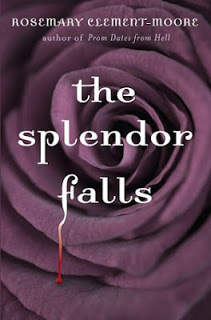 FW: The blend of history and mystery really works – readers who don’t live in Texas now are even more intrigued about the state! It seems like all kinds of awesome things happen there…
FW: The blend of history and mystery really works – readers who don’t live in Texas now are even more intrigued about the state! It seems like all kinds of awesome things happen there…
Last year on the VOYA blog interview, you said, “It seems like all the advice you get as a teen either centers on “Be sensible” (uninspired) or “Follow your dreams” (utterly impractical). It’s like you only get a choice between being a tortoise or a hare. But there is a middle ground between a safe, sensible rut and throwing yourself off a ledge and hoping you’ll fly. Dream big, with a hare’s energy and enthusiasm, then work toward it with a tortoise’s dedication and purpose.” That comes across as the Best. Advice. Ever for a young person or, heck, anyone. How do you apply that to your writing life? Do you feel that you take risks in your work, or are you more of a writer on the middle ground? What do you think of the idea that writers must take risks and ride the edge, or fail to make an impact in this market? Do you have any thoughts on the YA market right now, with ebooks on the rise?
RCM: I recently saw The Avengers, and the reason that’s such a great movie is that the director doesn’t hold anything back for the sequel. Whedon doesn’t say “Oh, we can’t go that big, or how will we top it in the next movie?”
One of the things I struggle with as a writer is holding back from big ideas, big emotions, big risks. I’m worried it will seem cheesy or over the top, or my characters will seem melodramatic. But holding back cheats me out of my best work, and my readers out of the best story–especially where emotional stakes are concerned.
As for how that relates to the market, I’m not sure. It’s a very fluid time, with e-books and small/big/self publishing opportunities. But this will always be true: You have to write the book that you want to write. Art should, first and foremost, tell the story you want to tell. Because you can’t control all the variables of the business end of things. All you can really control is the words on the page, so they should make you proud, whether they’re read by a hundred people, or a hundred-thousand.
So, we’ve noticed that writers are often thematically recognizable – that is, eventually, you can discover a common thread throughout most of their books. We’ve determined that at least one of your threads is the strong, feisty, “make-the-best-of it” heroine who may not have had her first choice in chance, family, or location, but who pulls things off regardless. (Maggie really would like to ignore a.) prom and b.) Stanley c.) her ability to see the supernatural; Sylvie does not want to be in Alabama, period, not to mention not the not dancing and the ghoulies; even as she loves them, Amy really wants to disassociate from the WEIRD known as her family) What would you say are your recognizable themes? Do you build your story for them deliberately, or do they show up in your writing more organically?
RCM: I like to think about my heroines as “resourceful,” so I totally see how “make the best of it” fits into that. I keep hearing Tim Gunn from Project Runway in my head: “Make it work.” But that’s sort of my life philosophy. Happiness and success aren’t handed to you–but the tools for achieving them are inside all of us.
It’s extremely important to me that my girl protagonists solve their own problems–even if it means recruiting help from a guy or a mad scientist sister or evil genius BFF. Sometimes life isn’t about being the best at one thing–strongest, smartest, most superpowered. It has to do with being able to adapt to the needs of the situation. Plus, I think the most interesting stories are about what a character does when they can’t have what they want.
Family is a big theme in my books, which I think comes from reading Little Women sixteen times when I was a kid. You’ll also see a lot of old things in my books–history and legend and actual artifacts that intertwine with the present-day story. That’s just because I love history. (Archeologist was on my short list of career choices, but I don’t like to camp.)
According to our research, PROM DATES FROM HELL, published in 2007, boasts the same first paragraph as the initial quick scribbles from your original manuscript. Have you ever been that lucky again? Do you normally do several stand-alone scenes from what’s going on in your head, and then piece them together, or do you come up with a continuous full-length full draft, and go from there? What book has been the hardest to piece together craft-wise?
RCM: I almost always write the first paragraph first, which stays virtually unaltered throughout revisions. The opening image is pretty solid in my mind when I put fingers to keyboard. I generally do a lot of thinking about a book before hand. It’s like filming a movie in my head. (Sometimes my working looks a lot like staring into space.) When I get enough key scenes visualized, I can start to put them into words. But I always start with the beginning and movie forward.
I write mostly in sequence, with one big exception. I always get to page 286 and then have to skip forward to the end of the book. Page 286 (give or take a few manuscript pages) is that moment when the characters gear up for the final confrontation. I always get stuck there. But if I go and write the climactic battle, then I know what they need to collect/learn/do in order to get to the big boss fight at the end.
RCM: When I was in high school I was up late reading a spooky novel, when I heard footsteps on the gravel outside my window. I froze, trying not to even breath, then heard a tap on the glass, and someone whisper my name. Of course I screamed bloody murder. And of course it was just my brother sneaking in late, having forgotten his key. He was so busted, and so mad at me.
2. In previous interviews, you mention being involved in theater. Are you still actively involved? Would you consider turning a book of yours into a play? Which one do you think lends itself to that treatment the best?
RCM: I’m not involved in theater any more, but I have to say that I use all my acting chops in my writing–characterization and motivation and internalization and “method” acting. Only it’s more fun because I can play any character and I don’t have to stay on a diet.
I do miss performing, though. It’s a thrill. But it’s also really stressful and time consuming, and I have books to write!
My books would have way too high special effects budgets for the stage, but I’ll bet any of them would make a great movie. I always envisioned the Maggie Quinn series as a monster of the week TV series (can you imagine the cross-over potential if Maggie and Lisa met Sam and Dean Winchester from Supernatural?) but I think Texas Gothic would make the best movie. (I can dream, right?)
RCM: Yes, hair model. Basically it means you have to let them cut or style your hair however they want to and take lots of pictures. It was really fun to do, but the problem with those edgy styles they do for hair shows is that they take way too much effort and styling product for my daily life. I’m all for a great haircut, but my requirement is Low Maintenance.
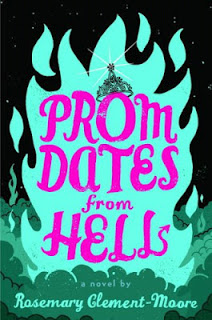 4. In an interview with your Prom Dates From Hell character, Maggie Quinn, you said you are known to sing random snippets of Gilbert and Sullivan. Which operetta’s your favorite?
4. In an interview with your Prom Dates From Hell character, Maggie Quinn, you said you are known to sing random snippets of Gilbert and Sullivan. Which operetta’s your favorite? RCM: Probably Ruddigore, which isn’t as well known. But it’s a gothic story with ghosts and a cursed baronet and a heroine named Rose Maybud… Sort of irresistible, really. HMS Pinafore is also a favorite and, of course, the Pirates of Penzance. Because I love Penzance and I love pirates.
You know what’s weird? No one ever asks me if D&D Lisa has a last name.
The answer is, “yes.”
Thanks for interviewing me! It’s great to get to talk writing with people who love reading!
Yesterday Tanita was interviewed at the Happy Nappy Bookseller, and Doret makes her look intelligent! Go, read! And for today’s other SBBT interviews, see:
- Cynthia Levinson – The Happy Nappy Bookseller
- Amy Reed @ Stacked, talking Crazy. No, the book, we mean.
And visit Chasing Ray for the full SBBT schedule for the week, complete with links.
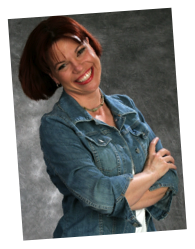
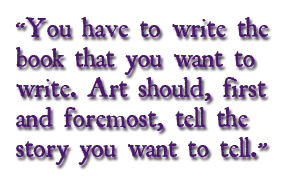
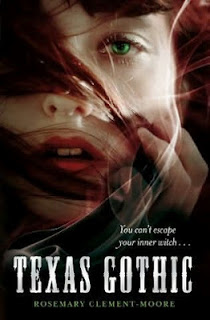
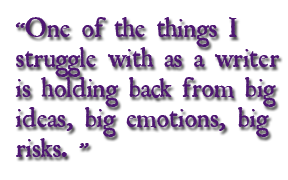

I love this interview and it makes me wonder why haven't I read Clement- Moore before. Especially since I'ved eyed Texas Gothic more then once. And I go have a thing for ghost stories and mysteries.
Just added it to my library queue. Thanks ladies,
@ Doret – you will REALLY enjoy her work – she's hilarious, and snarky and the action just gallops along. Backyard bbq reads, for sure.
I finished Texas Gothic today and loved it.
Oh, yay! I keep hoping for more Maggie Quinn… The Splendor Falls is an interestingly nuanced book – you'll enjoy that, too.